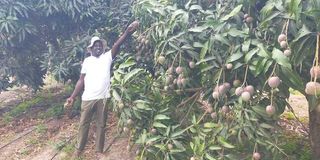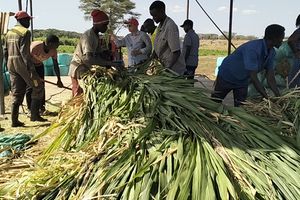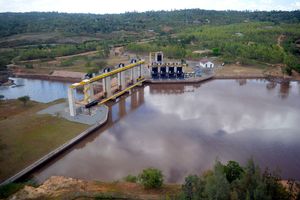
Alex Ole Mula is a small-scale exotic mango farmer from Kisaju village in Kajiado East Sub-County.
Small scale herders in the vast Kajiado County are currently diversifying into crop farming away from the traditional pastoralism owing to adverse effects of climate change.
The 2020-2022 dire drought that resulted in mass animal deaths and left hundreds of households starving, according to the National Drought Management Authority (NDMA) data, exposed the herders' soft underbelly on food security, jolting herders into crop and fruit farming.
In Kisaju village, Kajiado East Sub-County, Alex Ole Mula, 46, is reaping high yields of mango fruit farming, a venture he bumped into six years ago by sheer luck when a local university researcher was conducting exotic apple mango growing research in the village and gave local herders some seedlings to try out.

Alex Ole Mula is a small-scale exotic mango farmer from Kisaju village in Kajiado East Sub-County.
Herders were also trained on ideal planting methods
Mr Mula is also a small-scale exporter of little-known basil herbs and tomatoes on his 10-acre piece of arable land that is under drip irrigation and is powered by solar energy.
Mr Mula told Seeds of Gold that contrary to traditional cattle rearing, mango farming has become an alternative source of livelihood with an available local market.
"I have been harvesting hundreds of fruits twice annually, fetching Sh10 per fruit, making it a lucrative venture. I make at least Sh40,000 per harvest. The populous Kitengela township provides a ready market for the fruits. Customers also come for the fruits from the farm,” said Mr Mula.
He said, mango farming has been proven tenable in the semi-arid county considering the tree requires less water and and is resistant to pests compared to other fruits the herders have tried recently.
"I hardly take care of the mango trees. Apart from applying manure at the base of the tree once per year, I only water them when it's extremely dry and wait for the harvest day. In future, I will consider planting more mango trees," he added, challenging local herders to diversify into mango farming to form a society that would propel them into mango value addition for more profits.
According to the Ministry of Agriculture and Livestock’s data for 2024, mango farming is a significant sector, with the eastern and coastal regions being the main production areas, contributing 79 per cent of national acreage and volumes.
In 2024, the World Bank in partnership with the Narok County Government, initiated agriculture extension services to facilitate farmers to make informed decisions.
The programme, dubbed Agricultural Value Chain Development Project (NAVCDP), entails free training and consultation on modern farming by trained agripreneurs to rural based farmers.
The 175 youthful agronomists with a background on agriculture courses has been mandated to sensitize farmers on the need to transition to a more profitable livestock-keeping culture, modern agricultural practices, inputs and advice on available markets.
The extension officers who have been enrolled on a monthly stipend on a renewable six months contract are working in their respective wards.
Governor Joseph Ole Lenku maintains the move will be key in boosting food security, reducing imports, and growing exports.
"Climate change adverse effects reality has hit pastoralists harder. It is time that the Maa community embraces economic activity change. The traditional livestock keeping is no longer sustainable. The agri-preneurs will be key in changing the mind set of farmers who are still grappling with massive losses and the difficulty of embracing change, “said Lenku during the program launch.
Agri-business is said to be doing well in parts of Kajiado South, East, Central and West Sub counties with Hass avocado and dragon fruits.






